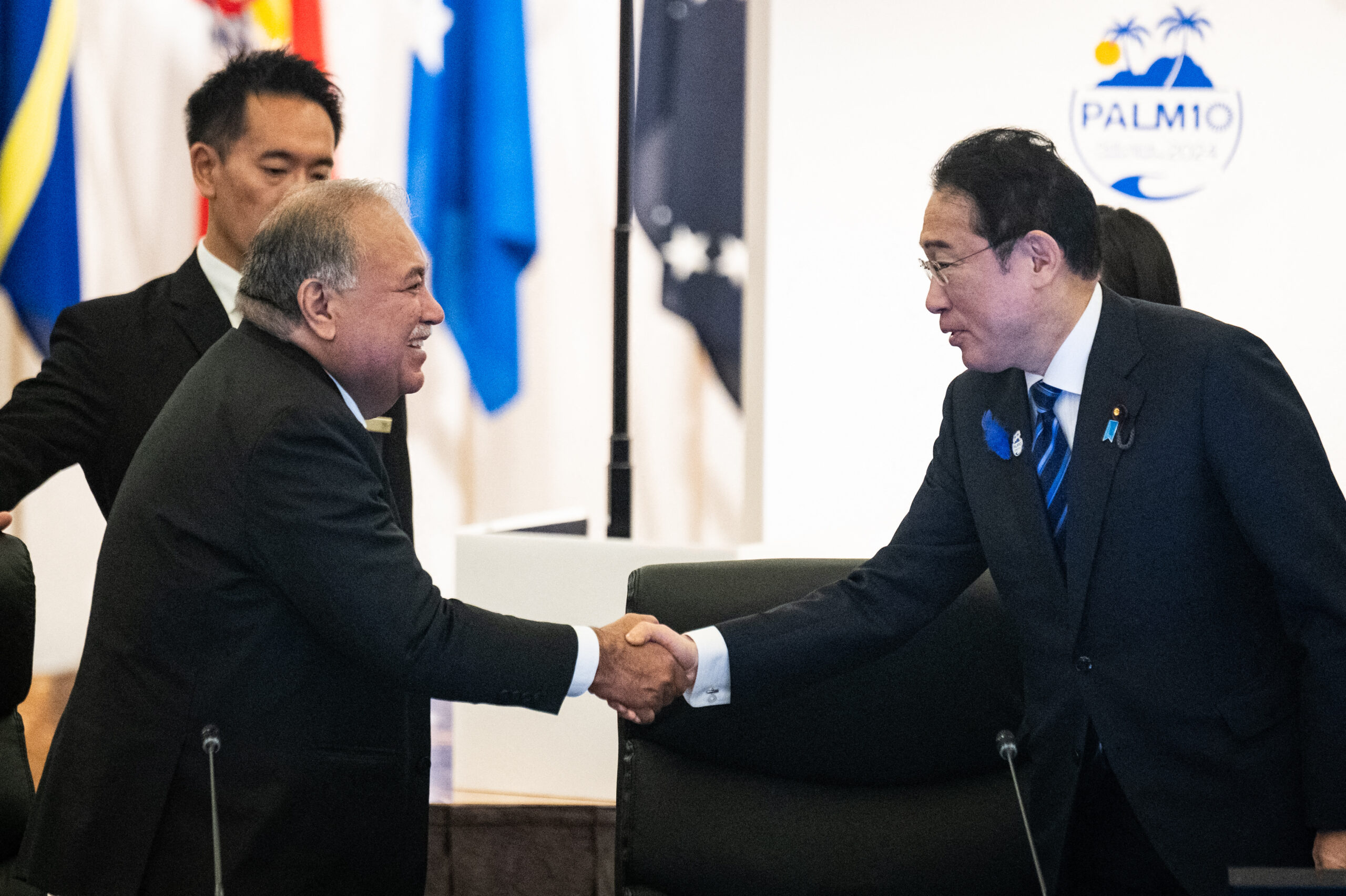
Secretary General of the Pacific Islands Forum Baron Waqa (L) and Japan’s Prime Minister Fumio Kishida shake hands during the opening session of the 10th Pacific Islands Leaders Meeting (PALM10) in Tokyo on July 18, 2024. Agence France-Presse
TOKYO — Pacific island states and Japan sharpened Thursday their stance on regional security, in a veiled swipe at China’s growing influence and military capacity.
The 18 Pacific Islands Forum (PIF) members and Japan said in a joint statement they “expressed strong opposition to any unilateral attempts to change the status quo by the threat or use of force or coercion anywhere in the world”.
Such phrasing is often used by the United States and its allies to refer to Beijing’s efforts to boost its military and diplomatic clout.
READ: Pacific islands, in spotlight, to push climate change in South Korea summit
Although the declaration at the 10th triennial PALM summit in Tokyo did not mention China explicitly, its language was stronger than at the last talks, held virtually in 2021.
“Leaders committed to ensure a peaceful, stable and prosperous Asia-Pacific region, and noted with concern the rapid military buildup which is not conducive to this end,” Thursday’s statement said.
They “called for proactive, responsible and transparent engagement to uphold regional peace and security”, it added.
READ: Trilateral event at Indo-Pacific forum to eye Luzon corridor investments
China and Western countries have been vying for influence across the hotly contested Pacific region, offering aid for infrastructure and security.
Ships carrying vital energy imports to Japan pass through the waterways surrounding the PIF members, which are also important fishing zones for Tokyo.
“The environment surrounding us has changed a lot since the first PALM summit was held, and we are facing complicated challenges,” Japanese Prime Minister Fumio Kishida told reporters.
China fears
China signed a secretive security pact with Solomon Islands in 2022, sparking fears it could one day use the island to gain a strategic military toehold despite assurances from Beijing and Honiara.
In January, PIF member Nauru became the latest country to cut ties with self-ruled Taiwan in favour of China.
The move leaves only 12 states worldwide that recognize Taipei diplomatically — including the Marshall Islands, Tuvalu and Palau, all PIF members.
Palau’s president told Japanese media outlet Nikkei Asia this week that pressure from China, which he blames for a major recent cyberattack, had reached a “new level”.
The country has also appealed for help in tracking Chinese research vessels in Palau’s exclusive economic zone.
Thursday’s joint statement called for a “free, open and sustainable maritime order based on the rule of law”.
It also said the countries would “strengthen defense exchanges through port calls in the Pacific by Japan Self Defense Force aircrafts and vessels”.
“We can see this stronger language as a win for Tokyo, which will have pushed for it,” said Ian Hall, professor of international relations at Australia’s Griffith University.
“But I think we also need to say that most or not all Pacific island states consider climate change a far bigger challenge than China’s fast-growing military power,” he told AFP.
Fukushima water
The three-day PALM summit brought together Japan and representatives from PIF nations including Australia and New Zealand, who did not send their prime ministers to Tokyo.
The joint statement said the leaders acknowledged climate change “as the single greatest existential threat” to security and livelihoods in the Pacific.
READ: Pacific islands urge Japan to delay release of Fukushima waste over contamination fears
Japan had hoped to use the summit to soothe fears over the release of treated wastewater from the Fukushima nuclear plant, which went into meltdown after a 2011 tsunami.
In November, PIF leaders issued a joint statement of “strong concerns” about the release, endorsed by the UN’s nuclear energy agency, the International Atomic Energy Agency (IAEA), but slammed by China.
“I explained that we will strengthen the sense of safety among the Pacific island nations while closely cooperating with the IAEA and continuing to share information,” Kishida said Thursday.
Japan also announced various new aid projects including sending fire-fighting equipment to Tonga as part of its contribution to recovery efforts after a 2022 volcanic eruption.